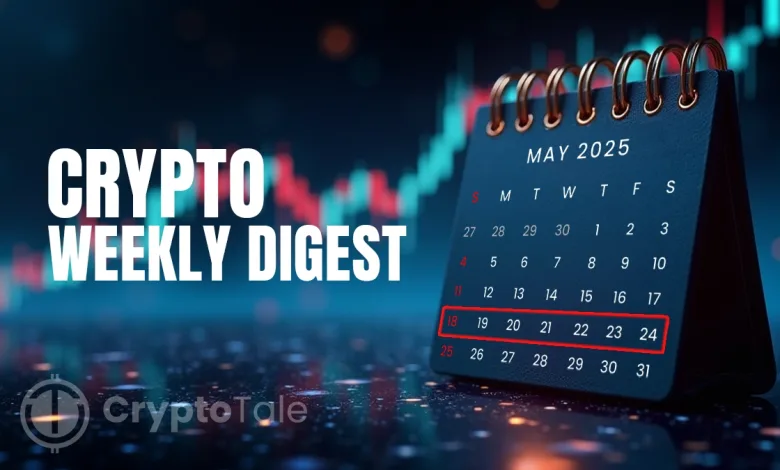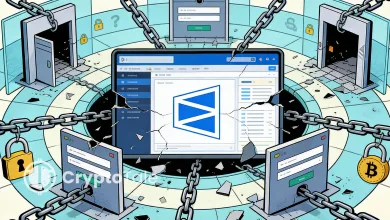The Crypto Weekly Digest May 26: Bitcoin Hits $111K on Pizza Day Rally

Hey folks! Welcome to the latest edition of our Weekly Crypto Digest, where we unravel and dig out the latest happenings that took place in the past seven days.
Last week remained a joyous week for the crypto market. After four months again on May 22, Bitcoin reached a new all-time high of $111,900, coinciding with the fifteenth anniversary of Bitcoin Pizza Day. This surge follows a steady climb that began in early 2024 when BTC traded around $74,000. Despite an intraday pullback of 0.30% this week, Bitcoin’s bullish trend remains intact.
Ripple marked a milestone by officially expanding its presence in the United Arab Emirates. The company has onboarded Zand Bank and fintech firm Mamo as its first blockchain-powered payment clients in the region. This expansion follows Ripple’s approval by the Dubai Financial Services Authority (DFSA) in March 2025, making it the first blockchain-enabled payments firm licensed to operate under the DFSA’s regime. According to Ripple’s latest blog, this license now allows the firm to facilitate 24/7 cross-border payments with near-instant settlement, greatly reducing costs and operational friction across international transactions.
Meanwhile, XRP continues to gain institutional traction. The Chicago Mercantile Exchange (CME) Group launched new XRP futures products on May 19, including both Micro XRP futures (2,500 XRP per contract) and standard contracts (50,000 XRP). These products are tied to the CME CF XRP-Dollar Reference Rate and mark a step forward in institutional trading of Ripple’s asset. Ripple CEO Brad Garlinghouse praised the move, noting that Hidden Road successfully cleared the first block trade, further legitimizing XRP among professional investors.
El Salvador’s Bitcoin strategy is also beginning to show results. President Nayib Bukele confirmed that the country’s Bitcoin holdings, accumulated since 2021, are now in profit. As of the previous week, El Salvador owns 6,181 BTC, valued at over $644 million, with unrealized gains of around $357 million. The government’s dollar-cost averaging strategy—buying one BTC per day since 2022—has proven effective, especially with Bitcoin’s recent rally.
Related: India’s Top Court Seeks Urgent Rules on Crypto Trading
However, not all market movements were celebratory. Cetus Protocol, a prominent decentralized exchange (DEX) on the Sui blockchain, suffered a major exploit. Early in the week, over $200 million allegedly vanished from its liquidity pools, triggering sharp crashes in token prices, with some falling by more than 90%. The DEX’s trading functionality collapsed as panic spread, and USDC on Sui briefly depegged, trading at pennies before stabilizing. The incident has raised serious concerns about DeFi security on emerging chains.
Regulatory oversight also made headlines. The U.S. Securities and Exchange Commission (SEC) filed fraud charges against Unicoin and several of its executives on May 20. The complaint, filed in the Southern District of New York, accuses the firm of misleading investors with exaggerated claims that its token was backed by global real estate. Among those named are CEO Alex Konanykhin and former board chair Maria Moschini. The SEC alleges the company raised over $100 million under false pretenses.
In a separate technological stride, Brave browser, in partnership with Unstoppable Domains, introduced the “.brave” domain—marking the first time a mainstream browser has launched its own blockchain-based top-level domain. Minted on Polygon and sold as NFTs with no renewal fees, these domains enable readable crypto addresses and decentralized website access, further simplifying crypto payments through Brave Wallet.
Traditional finance could very well be venturing further into digital assets now. JPMorgan Chase, Bank of America, Citigroup, and Wells Fargo have recently entered very preliminary discussions around the launch of a common stablecoin initiative. In the proposed collaboration that might include infrastructure firms such as the Clearing House or Early Warning Services, we see growing institutional interest in settlement systems based on blockchain.
Related: BTC Breaks ATH For Second Time in 2025, Sets New Record
Elsewhere, U.S.-regulated prediction market platform Kalshi expanded its crypto offerings by adding Solana (SOL) as a deposit method. This follows previous integrations of Bitcoin, USDC, and Worldcoin. Deposits are processed through Zero Hash and converted into USD, ensuring standard use across Kalshi’s regulated marketplace.
Lastly, Mihailo Bjelic, co-founder of Polygon, announced his resignation on May 23. In a statement posted on X, Bjelic cited differing visions for the project as the reason for his departure. His exit marks a critical turning point for the Ethereum Layer 2 solution he helped launch in 2017 under the name Matic Network.
The global crypto market saw a week of powerful developments, regulatory strides, price records, and institutional advances, anchored by strong momentum in Bitcoin and Ripple’s aggressive expansion in the Middle East.




